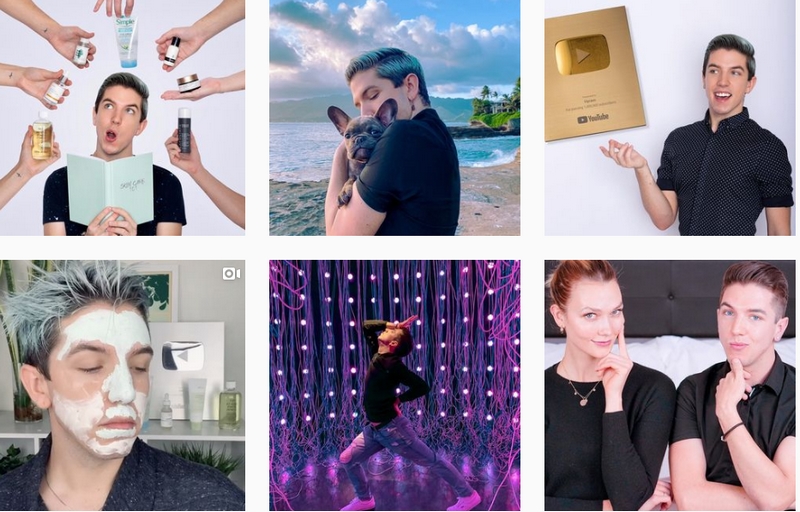He grew up on a cattle ranch in Arizona before moving to New York to work on a department store makeup counter. Now at just 24, despite having no formal dermatology qualifications, Hyram Yarbro is a skincare guru to millions worldwide.
Yarbro is one of a new breed of superstar social media “skinfluencers” who have gained popularity during lockdown – especially on TikTok – and are changing what we buy and why.
Lockdown affected grooming routines, with a shift to skincare from make-up and perfume. It will come as no surprise to anyone who’s tried to book a salon appointment since March that home-treatment sales are up, with teeth-whitening products up 180% and hair-dye sales six times higher than last year.
But it also affected how we discover new products. “There was an uptick in people accessing social media,” says Samantha Dover, senior beauty and personal-care analyst at Mintel, “but the real impact was among existing social-media users, who spent more time on these platforms and visited them more frequently. This meant they were exposed to more grooming content.”
Social media already has an established effect on product sales. “Half of beauty consumers look for reviews online, before making a purchase,” says lifestyle and skincare blogger Lesley Buckle, aka @freshlengths. “There’s also a lot of satisfying videos out there. Dramatic before-and-after visuals go viral.”

But in 2020, one platform emerged as the winner: TikTok. “Facebook and YouTube are important for beauty brands, but TikTok users are the most likely to get grooming advice from social media,” says Dover. Influencer marketing firm Traackr found that TikTok users’ engagement with skincare videos has increased by more than 1,000% since last year.
In March, Skincare by Hyram had 100,000 followers on TikTok. During lockdown that surpassed six million. “I feel gratitude for the connection I have with my followers on TikTok – I’m not able to replicate that on any other platform. Personally, however, the growth has felt surprisingly normal,” he says.
Yarbro’s knowledge about skincare ingredients, and funny, honest reviews have impressed beauty brands and followers alike. In January 2019 he made $50 from affiliate sales. By July 2020, he’d made $265,000 from online ads, brand partnerships and affiliate links.
What many of these biggest new names in skincare lack in formal qualifications, they make up for in enthusiasm and humour – and vast audiences across YouTube, Instagram and TikTok.

Many skinfluencers are just about the fun of skincare such as Young-Seok Yuh – whose @yayayayoung TikTok account has gathered 1.2m followers since launching in March, and Vi Lai, who often talks about using skincare as a coping mechanism to deal with anxiety and depression. There are also qualified dermatologists such as Dr Dustin Portela, whose @208skindoc has just under 1m followers and aesthetic therapists such as Nayamka Roberts-Smith.
Popularity on TikTok does seem to affect sales. CeraVe is a high street skincare brand for dry and problem skin that launched in the UK in 2018. But a 67% increase in influencer posts about CeraVe in 2020, according to influencer marketing firm Traackr, coincides with a run on sales. UK chemist Superdrug reported a 65% week on week increase in sales this summer and CeraVe sold out in the US.
The Ordinary was a hit skincare brand long before TikTok, but skinfluencers have affected sales, says Nicola Kilne, co-founder and CEO of Deciem, The Ordinary’s parent company. “The TikTok audience is truly global in a way that we haven’t seen before,” she says. The brand is a skinfluencer favourite, and only started its own TikTok account in February. “Our first video had almost one million views – #TheOrdinary alone has 229.1 million views.”
The Ordinary sold a bottle of its Niacinamide 10% + Zinc 1% – a serum for acne – every three seconds at the start of lockdown. Kilne thinks that time at home gave people more time to experiment.
“I believe honesty has built our fan base,” says Kilne. “Word of mouth is important for us, but this wouldn’t work if we didn’t produce quality products.”
Buckle agrees that quality is the key to the hit products of TikTok. “CeraVe’s mentioned by lots of influencers, but it’s successful because it’s affordable and the formulas are gentle. It’s exactly the sort of brand I reach for if my skin’s had a reaction.”
The skinfluencers of TikTok are also hits because of their honesty. “Traditional marketing fails to establish trust,” says Yarbro, who now lives in Honolulu. “People gravitate towards online creators who have real, honest opinions. When a creator establishes trust with their audience, its reach exceeds any marketing budget or exposure strategy. People are drawn to people.”
guardian.co.uk © Guardian News & Media Limited 2010
Published via the Guardian News Feed plugin for WordPress.


